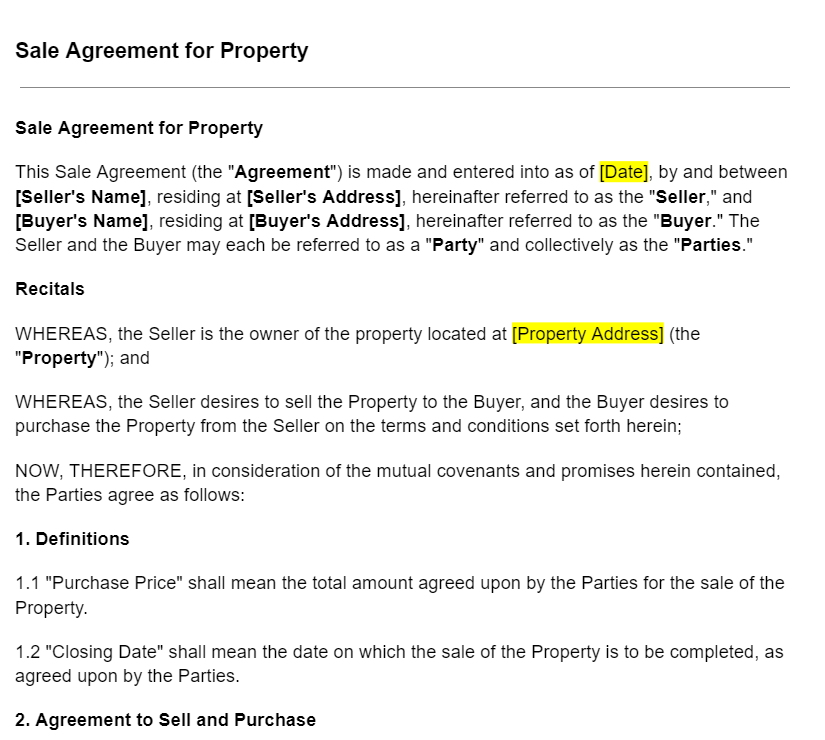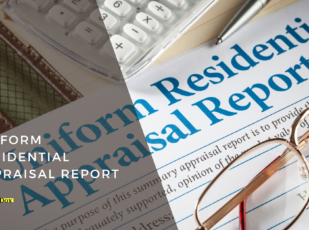
Sale Agreement for Property Template
6 Downloads
Real Estate
February 17, 2025
Sayantani Dutta
A binding contract underlies the success of any property transaction, specifying under what terms a property will pass over to its new owner. This legally binding agreement establishes important information, including total purchase price, closing date, and financial terms for both parties involved.
Without this document, property sales lack proper form under the law, increase uncertainty and risk of disputes occurring. Ensuring the required disclosures and conditions are articulated protects both parties’ financial interests and adheres to state laws governing real property transactions.
This guide covers the most important aspects of a real estate purchase agreement template, explaining its role of clarifying terms in the sales contract, reducing risks, and assuring a proper transition in property title between parties.
Why a Sale Agreement is Needed
A well-drafted purchase agreement template is the basis of a real estate transaction, offering a written understanding of both parties’ terms and requirements. Without this agreement, payment terms and legal requirements can become sources of costly misunderstandings. The agreement establishes important terms relating to the deal, protecting both seller and buyer if unanticipated complications arise before closing.
Legal Protection for Sellers and Buyers
Both parties benefit through establishing a binding contract that outlines their respective rights and obligations. A properly drafted agreement will include the disposition of escrow funds and any required disclosures. By including provisions for title insurance, warranties, and future encumbrances, the agreement eliminates legal risks and safeguards financial interests.
Preventing Future Conflicts
Disagreements often arise when contractual obligations are unclear. A detailed purchase agreement template addresses uncertainty through its provisions for both parties responsibilities for property taxes and assessments, and any work like repairs and upgrades to be completed in preparation for closing. If issues with title defects, zoning, or appurtenances arise, the agreement has a defined resolution mechanism, including arbitration provisions to circumvent high-cost litigations.
Compliance with Legal Requirements
State laws mandate a variety of real estate transaction disclosures. A comprehensive agreement will include provisions such as a lead-based paint disclosure for older residential property, requirements for written notice, and a legal description of the property. Ensuring that required disclosures and legally mandated terms are present in the agreement aids in preventing compliance violations that can cause a delay in, or even cancel, a sale.
How to Write a Sale Agreement for Property
A real estate purchase agreement template must be prepared with careful consideration of both parties’ financial terms, responsibilities, and rights. Legal oversight and diligent negotiations result in an enforceable agreement that creates security for both buyers and sellers.
Every section in the agreement serves a purpose, in a format that adheres to applicable laws and industry best practices.
Drafting the Initial Terms
The total purchase price and payment terms detail the financial arrangement of the agreement. Clarity averts conflicts by specifying how much is owed when payments must be received, and what portion of the amount will go toward an escrow fund.
The down payment is determined, and provisions for its refunding are established. If seller financing is involved, terms such as interest, payment schedule, and contract duration are included in the agreement.
A title company facilitates an escrow transaction through its selection of an escrow agent to manage earnest payments and monitor compliance with the terms of this agreement.
The contract also involves prorations for prepaid expenses, such as real estate taxes and payments for insurance policies, which are allocated between seller and buyer. Any personal property that is part of the sale, including appliances and fixtures, is specifically mentioned in a bill of sale to avert post-closing disputes.
A well-drafted purchase agreement template documents both parties’ financial and legal obligations in a property transaction. Every clause is deliberate and addresses the conveyance of property, payment terms, and compliance with laws.
Details of Seller and Buyer
Identifying the parties is the opening stage in documenting the transaction. The agreement requires the buyers’ and sellers’ full legal names, mailing addresses, and contact information. If a corporation is purchasing property, the agreement will specify the name of the corporation and its duly authorized signatory for and on its behalf. Accuracy in this section prevents controversy regarding enforcement and change in ownership.
Property Description
The legal description of the property must be specific, with information distinguishing it from surrounding lots. Elements such as lot number, boundary dimensions, zoning classification, and plot information recorded in the contract mention specific reference to conveyed real property. Appurtenances, and any accompanying personal property in the transaction, are likewise documented. If easements and restrictions, when applicable, are disclosed in an attempt to prevent future use conflicts, they should be included hereunder.
Responsibilities of All Parties
The contractual agreement between seller and buyer must be explicitly stated. The seller must deliver a clear title, preserve the property in its current state through closing, and pay for any agreed work promptly.
The buyer will have to pay in full—in good faith, secure financing, and make inspections promptly. If disputes arise regarding property conditions or payment schedules, accountability for these issues is addressed in this section.
Purchase Price and Payment Terms
The financial terms of the transaction are explicitly stated, specifying the overall purchase price, down payment requirements, and any earnest money deposits placed in an escrow arrangement. Payment schedules and financing terms, such as seller-financed terms and third-party mortgage approval, are discussed, too. The purchase agreement form will at times include provisions for prorating, assigning property taxes, homeowners’ association dues, and prepaid expenses between parties proportionate to the effective date of closing.
Conditions and Contingencies
Property transactions frequently include buyer or seller contingencies that must be met before closing. These provisions protect both parties in that both can withdraw from their contractual obligations if specific requirements have not been fulfilled.
Financing Conditions
The buyer’s financial ability will have a direct impact in structuring the financing of the property the purchase. A financing contingency identifies when a borrower must secure approval for a loan and describes consequences if funding fails to go through. Provisions addressing requirements for lenders, property appraisals, and title company confirmation, may sometimes be included.
Inspection Clauses
A buyer’s intention to follow through with a purchase will often depend on a professional property inspector’s report. The agreement allows a definite duration of working days for the buyer to make claims, inspect for fixes, and request changes according to the report received. If structural defects or safety concerns are discovered, negotiations can occur in an attempt to modify the purchase price or require the seller to pay for specific expenses in advance of closing.
Property Handover Terms
The transfer of title to property is scheduled for a closing date. Any agreements for seller continued occupancy, early possession for purchaser, and property maintenance requirements through delivery fall under this section. Customizing this section to the terms of a specific sale prevents move-in date conflicts.
Zoning Laws, Legal and Regulatory Disclosures
State laws compel sellers to disclose to protect buyers from unforeseen legal and financial repercussions. Local regulations detail how a property can be used. A buyer who intends to re-purpose a residential property for commercial use can face restrictions under city zoning categories. Any known restrictions in zoning, and any planned government development that will affect property, must be disclosed.
Outstanding Dues and Incumbrances
Liens, unpaid taxes, and unsatisfied encumbrances can obstruct a free and clear transaction. The agreement compels sellers to disclose any financial encumbrances placed over the property and guarantees that such debts will be cleared at property conveyance. A title company will typically work with this part of the agreement, reviewing it for any claims, and clearing them in anticipation of closing.
Penalties for Breach of Contract
Failure to comply with contractual terms involves legal and financial repercussions. If a buyer fails to obtain financing promptly, a seller can withhold an earnest money payment as a penalty for a failed transaction. If the seller unjustifiably defaults, then the buyer can seek damages, including payment for inspections and legal expenses. The agreement establishes the legal remedy for cases of non-performance, such as arbitration procedures for dispute resolution.
Signatures and Execution
The finalization of a sales agreement consists of signatures between both parties, confirming acceptance of terms. Witness signatures and notarization can vary according to state laws. The document also mentions the governing law under which the agreement will be construed and executed. A waiver can be included in this section, excluding both parties from canceling the agreement for minor technical defects or explaining when the parties can cancel the contract with no legal repercussions. The title company, financial institution, and closing escrow agent receive copies for closing purposes.
Negotiating and Closing the Contract
Adjustments may be necessary after reviewing inspection reports. If significant defects in structure or significant repairs are uncovered, negotiations can lead to a price reduction in the purchase price or a seller agreement to cover certain expenses in advance of closing.
Some contracts have a waiver of liability in case the buyer takes possession of the property in its present state, excluding post-closing claims for defects. Special clauses include conditions precedent, in that, the agreement is not binding until certain events have taken place.
The sale of a property, financing, and resolution of any zoning issue are common contingencies. Any additional requirements, such as title insurance and homeowners’ association covenant compliance, are addressed in detail specifically.
Engaging Legal and Real Estate Experts
Real estate transactions involve complex financial and legal considerations, and receiving expert advice is a must. A real estate agent helps in negotiation and planning, seeing to it that both parties agree to beneficial terms and move through each stage of the sale process.
An inspection report can be purchased to assess the property. This step is important in FHA loan deals that must meet specific federal requirements. The findings of this evaluation can impact negotiations, necessitating modifications to the agreement or new contingencies.
Attorneys review the agreement and a title company examines title documents to disclose any easements and liens that impact conveyance.
Common Mistakes in Sale Agreements
Errors in a sales agreement can result in unnecessary delays, financial complications, and legal disputes. A well-structured agreement lessens uncertainty and protects both parties from adverse legal consequences. Identifying common concerns and resolving them early helps to avert complications in the transaction process.
Missing Legal or Financial Documentation
Skipping legal and financial due diligence will heighten dispute risk. A title search will confirm whether a property holds any liens, claims, or encumbrances that can impact its sale. Buyers relying on financing must verify loan terms, while sellers should confirm that escrow accounts and deposit structures are properly arranged. Overlooking these items can result in financial loss, default under a contract, and difficulty closing out a transaction.
Overlooking Contingencies
Failing to make provisions for contingencies leaves parties at risk for unforeseen occurrences. If financing cannot be secured or an inspection report reveals defects in property condition, an agreement with no contingent terms can force a buyer into an unwise purchase or a seller into post-sale dispute resolution. The contract must specifically state what will occur in case of a failed approval for a loan, expensive maintenance requirements, and any other terms impacting the sale.
Why You Need a Professional Template
A well-drafted sales agreement forms a strong foundation for the transaction, protecting both seller and buyer against financial and legal complications. Without a documented agreement, ambiguities in language, incomplete disclosures, and undefined provisions can generate controversy that will hinder, and even cancel, the sale. Using a professionally designed template promotes uniformity and legal compliance while reducing.
Unclear terms in a property agreement can lead to conflicts over payments, possession rights, and the costs of maintenance or repair-related work. A properly worked agreement puts these terms in writing in explicit detail. Templates designed by legal professionals provide standardized language that minimizes ambiguity, making enforcement easier if disputes arise.
A professionally prepared purchase agreement form offers fully customizable pre-drafted sections for financing terms, earnest payments, and title examination, covering all the important provisions for a successful deal.
While templates form a sound starting point, real estate laws vary state-by-state. A legal expert can review the agreement, confirm compliance with applicable laws, and make recommendations for any additional terms a particular sale will require.
Download a Free Sale Agreement for Property Template with a Trial of FreshDox
FreshDox brings you professionally drafted sale agreements fully customizable to the terms and conditions of your deal. Try a free 7-day trial of our platform and get immediate access to our catalog of professional business templates for real estate transactions. Basic accounts get three free downloads a week, and Premium accounts get unlimited downloads, with no obligation to continue your subscription after the trial period ends. Sign up for FreshDox today and get a risk-free trial of our platform.
Popular searches:
- Sale Agreement for Property Template pdf
- Sale Agreement for Property Template sample
- Sale Agreement for Property Template download
- Sale Agreement for Property Template format
- Sale Agreement for Property Template template
- Sale Agreement for Property Template word
- Sale Agreement for Property Template free
Related Templates
Discover more templates that align with your needs and preferences.

Ready to Sign Up?
Sign up for FreshDox.com’s 7-day trial and discover why so many individuals and businesses trust us for their legal document template needs.
- Cancel any time
- 7-day free trial
- From 300+ Customer Reviews
















